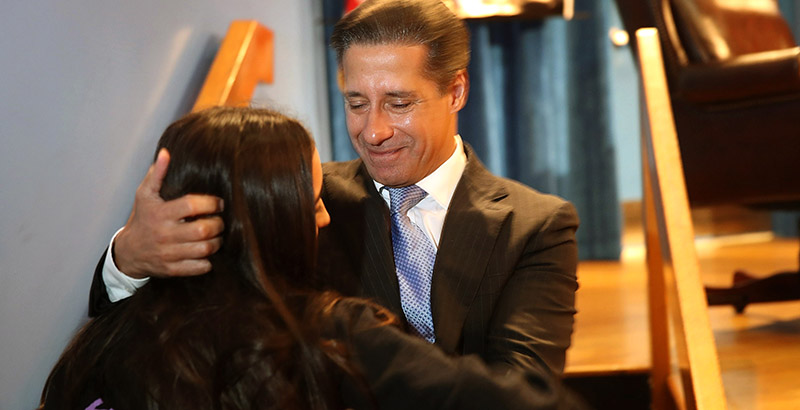Carvalho Staying Put Is a Win for Miami but a Huge Loss for New York, the Country, and Expanded Educational Choice

When I saw the headline announcing that Miami-Dade Superintendent Alberto Carvalho would be the next chancellor of New York City public schools, I winced, though I can’t say I was surprised. Don’t the Yankees eventually try to get all the best players?
Thankfully for Florida, Carvalho decided to stay in Miami.
Unfortunately for the rest of the country, his sweeping vision for dramatically expanding educational choice won’t get a chance to shine on America’s biggest stage.
Carvalho, more than any other superintendent in the country, has embraced the new definition of public education. Most superintendents cling to the old definition: All tax dollars raised to educate children will stay in the district’s hands, the district will run all the schools in a fairly uniform manner, and it will assign kids by ZIP code. Carvalho bravely embraced the new definition: Parents will be empowered to direct taxpayer dollars raised to educate their kids to different providers — and even to different delivery methods — that best suit their individual children’s learning needs.
Understand this fact: In Carvalho’s district, the fourth-largest in the country, more than 70 percent of the roughly 400,000 students do not attend their zoned public school. That’s not a typo. These students attend charter schools, take classes over the internet and at local colleges, and even attend private, faith-based schools — all with taxpayer funds or under tax credit scholarship programs. There are now more than 62,000 students at 128 charter schools in the district. There are now more than 26,000 students in the district attending 439 private, mostly faith-based schools under the tax credit program for low-income children.
But the largest category of parental choice in Miami-Dade? District-created and -run magnet schools. Carvalho and his team have created more than 100 of them in the past decade. Many are among the top schools in the country. Some offer unique curricula, like his art and design magnet. Others have unique learning environments, like his all-girls high school. Carvalho recognized early on that he could either fight parental choice or embrace it to drive improvement. He chose the latter — and under his leadership, Miami-Dade has been one of the best-performing large urban districts in the country.
Does this sound like your typical superintendent? “Children are not widgets, and schools cannot be assembly lines of knowledge. That’s why we have 460 choice programs and 102 magnet schools.” That’s Carvalho in 2015. How about this: “We are now working in an educational environment that is driven by choice. I believe that is a good thing. We need to actually be engaged in that choice movement. So if you do not ride that wave, you will succumb to it. I choose not to.”
You have to understand how radical he has been. Last year, the Florida Legislature passed a sweeping law that included extra funds to incentivize high-quality charter operators to open near low-performing district schools. Almost every superintendent opposed this provision. Carvalho, though, recently announced he’s giving free space in an existing elementary school to KIPP so it can open a school in a low-income neighborhood. Contrast his reaction to that of his neighbor to the north. After banning all charter schools from a recent “choice fair” for parents, Palm Beach County Superintendent Robert Avossa said: “This is what the charter movement’s about — it’s about spurring competition. So if that’s the case, why would you invite the competition to your event?”
Many school leaders are afraid of the changes to education that technology will bring. Not Carvalho. He created iPrep Academy, an award-winning school using space in the district administration building where students create their own learning experience mainly through online learning and collaboration. Oh, and Carvalho’s the full-time principal.
I had the great pleasure of meeting with Carvalho and visiting one of his magnet schools, as we are both members of a state business leadership group. We instantly agreed that public schools are overregulated. He knows the difference between market accountability and regulatory accountability — and he knows you can’t regulate your way to excellence.
For sure, it would have been fascinating to watch Carvalho in the biggest spotlight, leading the nation’s largest school district.
The Big Apple is a tough venue, especially in education. The teachers union there is the roughest in the country. His almost boss, and the local papers, castigate Success Academy’s Eva Moskowitz for the crime of delivering amazing results for high-needs kids.
I’m sure Carvalho would have risen to the challenge. In the process, people in NYC and beyond would have been treated to an amazing sight — a big-city superintendent riding the school choice wave, instead of trying to stop it.
John Kirtley is chairman of Step Up for Students, a nonprofit that administers Florida’s tax credit scholarship for low-income children and Gardiner scholarships for special needs children.
Get stories like these delivered straight to your inbox. Sign up for The 74 Newsletter

;)